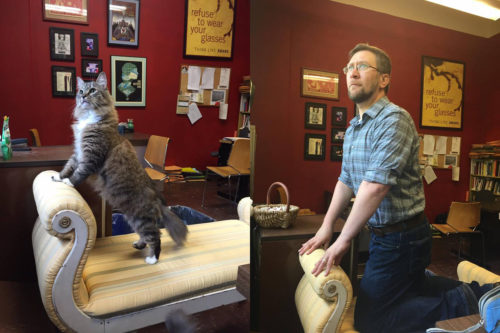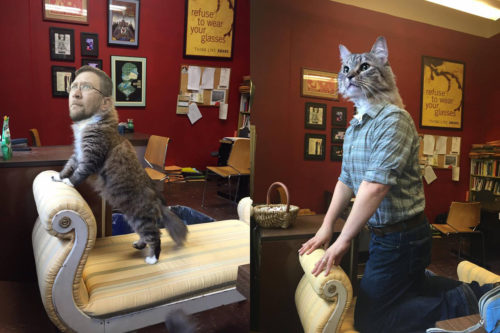Sketch Fridays #22 – Photoshop Madness
Language is a clever creature. First, we must recognize that language is alive; a thing that eats and sleeps, makes refuse and narrows decisions wholly on its own logic for survival. I’m not versed enough in other languages to make bold declarations about English within that scope, but it is definitely known for being amorphous and progressive, especially at times when it needs to be the inverse of both.
One major tick English has is the ability to transpose––like the philosopher’s stone––words from one state into another. I wanted to write “to verbize,” which is an example of what I’m talking about, where I shifted a word from a noun to a verb. The users of English are like scavengers in a post-civilized wasteland, scrounging out artifacts and assigning new tasks to them. The thing with English is that such a trick can be done. There are few single-use words in English, which makes it fascinating and dangerous.
I speak a lot about this type of jargonistic behavior in my writing classes, but, as people working together to accomplish shared goals as efficiently and effectively as possible, finding ways to say and write things in fewer words is a key component of a community working well. To illustrate, we created the verb, “to google.” The lineage of the word is pretty obvious, but linguistically it is simply jargon on a large scale (rather than being jargon used by a very select few). We have boiled down to a single verb what used to be said as “look something up on the internet.” Efficiency. Efficacy. We happened to borrow the skin from a major corporate entity.
This isn’t new in the English-speaking world. We did the same with Xerox, Kleenex, Aspirin, Laundromat, Band-Aid, Frisbee, Tupperware and many others. One such frequently used neologism in the world of popular media and art (such as webcomics) is Photoshop.
“To Photoshop” is (according to Merriam-Webster) “to alter (a digital image) with Photoshop software or other image-editing software especially in a way that distorts reality (as for deliberately deceptive purposes).” I think the last part is a little harsh, but I would agree with it being the shorthand for saying we want an image digitally altered.
The problem with this word is that to make a word into a verb makes it into, ostensibly, a singular action. However, to alter images in image-editing software is a process (something else I talk a lot about in my classes) that can often take hours and a plethora of tools, techniques, and talent. However, as popular culture likes to point out––and digital artists as well––there is no “photoshop button” that instantly figures out what you want to do to an image and does it for you (though, admittedly, Photoshop does give users the ability to program automated processes––called “Actions”––that allow you to do a series of steps with the press of a single button, but they are more for time saving than producing finished works).
Despite the growing roster of competent and advanced photo-editing/digital art programs available now, I use Photoshop because it’s what I learned back in 1999. Over that time, and iterations of the software, I have garnered my share of aptitude within the program (though I’m sure I am using a way over-powered program for the actual stuff I do), the least of which is photo editing.
–––––––

Where it all started. Photos by Anita Scarf.
At CSU, Sacramento, I share my office with three lecturers who are all wonderfully creative people. Catherine Fraga is a poet, Shelley Blanton-Stroud is a writer, and Anita Scharf is a photographer.
One recent weekend, Anita brought her cats into the office as important things were happening toward the sale of her house. Her cats are problematically photogenic and, being a photographer, Anita eases their burden by taking their photographs often. Such was the case that weekend. One of her creatures, Fabiana, was looking out the window at birds flying between the trees whose leaves shuddered with the warming breeze that’s blowing this time of year. She propped herself on to the esoteric lounge we have in the office, creating yet another perfect photographic opportunity, as is her wont, to improve her field of view.
Anita captured the moment and distributed it around social media and we were all aghast at yet another perfect picture of Fabiana (when will the terror of her beauty be granted repose?!). When I arrived to the office on Monday, I greeted Anita by replicating the pose, citing that I wanted to approximate what being beautiful felt like. My attempt must have been evocative because it compelled her to photograph the moment.
To prove that I nearly touched the sublime, I put the two photographs side by side since I had my wife’s laptop with me that day. I shared it around and we laughed for a good long while.
But something twisted in my creative recesses, a compulsion similar to the one Anita must feel when her cats hit those perfect poses.
Anita left to make copies and I hit my Photoshop button––focusing and cutting and pasting and slyly erasing and committing every idea to trial and error, resulting in what could best be described as an abomination. But I was proud of my work. In hindsight, I had effectively rendered into imagery not only a good joke, but exactly what the nebulous English language amalgam looks like: a little weird and uncomfortable, but worth it.


Discussion ¬